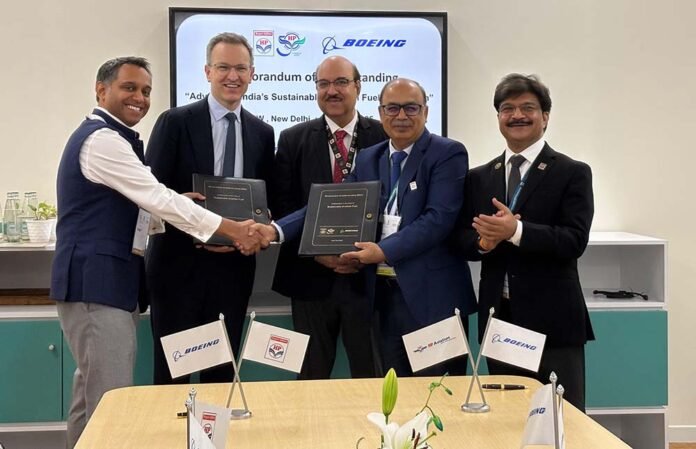NEW DELHI. Boeing and Hindustan Petroleum Corporation Ltd. (HPCL) on February 14 announced a partnership to help advance India’s sustainable aviation fuel (SAF) ecosystem and support the Indian Government’s environmental goals.
As part of this partnership, Boeing and HPCL will explore opportunities to scale SAF production in India, support the certification of domestically produced SAF, and advocate for policies to develop a robust SAF ecosystem in the country. They will also collaborate to implement sustainability standards and practices across the entire SAF supply chain, explore opportunities for training programs, and share leading practices with SAF.
“At Boeing, we are dedicated to developing products and solutions to help our customers achieve their sustainability goals. We recognise that SAF is a critical lever for decarbonising the aviation sector and that strategic partnerships within India’s aerospace ecosystem are vital to advancing SAF production. We are proud to collaborate with HPCL to drive sustainable aviation efforts in India, for India,” said Salil Gupte, president, Boeing India and South Asia.
Amit Garg, Director, Marketing, HPCL, emphasised the company’s leadership in sustainable energy solutions and its commitment to advancing clean energy initiatives, “As the global aviation sector intensifies efforts to reduce greenhouse gas emissions, the development and widespread adoption of SAF has become crucial to achieving long-term sustainability goals.”
In India, HPCL is actively working to commercialise SAF with a strong emphasis on its development and production. At the forefront of this initiative is the HP Green R&D Centre, which has pioneered and patented its proprietary Trijet technology for converting used cooking oil into SAF. Through cutting-edge research and innovation, HPCL continues to drive advancements in sustainable energy solutions, playing a pivotal role in the global transition toward a more sustainable aviation industry.
This partnership with HPCL underscores Boeing’s leadership and continued investments in SAF, including partnering with airlines, fuel companies, governments, and research institutions globally to expand SAF supply and reduce costs.
SAF lowers carbon emissions over the fuel’s life cycle by up to 84%, depending on the feedstock, and it has the potential to reduce even more in the future. SAF can be made from a wide variety of sources: cover crops and other non-edible plants, agricultural and forestry waste, non-recyclable municipal waste, industrial plant off-gassing, and other feedstocks.




